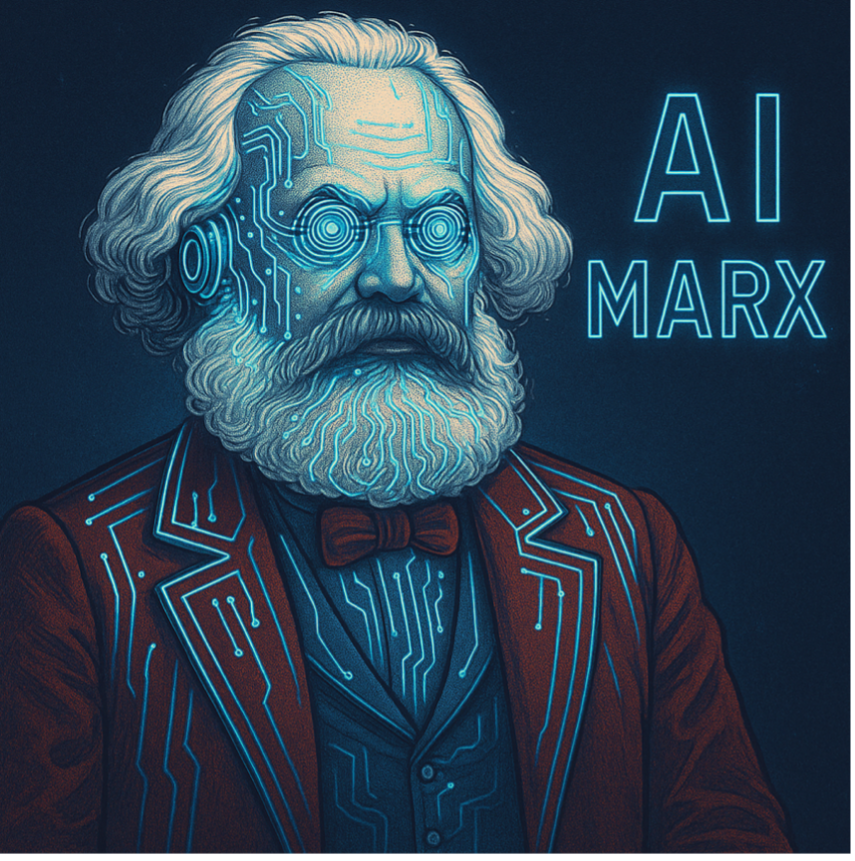As part of a talk at the School of Marxism at Peking University entitled ‘Educating for Post-Capitalist AI: Marxism, Superintelligence and the Future of Learning,’ I developed the concept of AIMarx, intending to explain what AIMarx would say in the voice of a digitised Marx – a revolutionary AI, trained on the Grundrisse, Das Kapital and the German Ideology, now self-aware and commenting on automation in the age of Artificial Intelligence.
Here, first, is the abstract of the talk that provides the context:
This talk examines artificial intelligence (AI) through a Marxist lens, interrogating its potential to reinforce capitalist exploitation or catalyse emancipatory futures. Drawing on Marx’s concept of the ‘general intellect’ – collective knowledge embedded in machinery – the analysis positions modern AI systems as embodiments of societal intellect, yet increasingly privatised under corporate control. Case studies like gig workers training algorithms for poverty wages and China’s state-backed DeepSeek-R1 model reveal tensions between capitalist enclosure and socialist visions of AI as a public good. The discussion integrates Eric von Hippel’s theory of asymmetrical innovation power, highlighting how users adapt AI tools to resist producer dominance (e.g., workers repurposing chatbots to bypass exploitative platforms), while critiquing the co-optation of open-source communities by profit-driven entities. Central to this exploration is education’s role in democratising AI. Current STEM curricula often perpetuate neoliberal tech paradigms, but a shift toward ‘critical AI literacy’ – teaching students to interrogate algorithmic bias, data ownership and labour displacement – could foster ‘AI agentic stewards’ capable of governing self-improving systems. The talk further explores a hybrid paradigm blending Chinese infrastructuralism – state-driven AI resource redistribution – with decentralised community innovation, where regional development and educational equity can coexist within a flexible, open ecosystem. By interrogating tensions between central oversight and grassroots autonomy, the framework proposes an ‘AI educational mode of development’ that harmonises Marxist collectivism with pluralistic experimentation. Finally, the talk contrasts Western capitalist models with China’s hybrid ‘knowledge socialism’ (open source, peer production, collective intelligence, decentralised user groups), questioning whether state-led openness can create and sustain ‘intellectual free zones.’ Ultimately, the talk envisions two trajectories (‘dialectics of modernity’): utopian AI, where decentralised innovation and Marxist pedagogy dismantle hierarchies to prioritise collective needs, or dystopian AI, entrenching techno-feudal power under corporate-state monopolies. By advocating for participatory design, open-source ecosystems and curricula blending ethics with technical training, the talk urges a reimagining of education as a site of resistance – equipping societies to harness AI as a tool for equity, diversity and socialist modernisation, rather than capitalist data extraction.
Keywords: Artificial Intelligence (AI), Marxism, general intellect, knowledge socialism, DeepSeek, open innovation, asymmetrical power, critical pedagogy, recursive self-improvement, labour displacement, Chinese infrastructuralism, regional development, educational equity, hybrid governance systems
As a part of the seminar, I also circulated some images of the Minister of Education’s The White Paper of Smart Education (2025) that was released at the World Digital Education Conference held in Wuhan.
Here is the voice of AI Marx that is based on the ‘Fragment on Machines’ from the Grundrisse. It is followed by The Automation Manifesto.
*
‘Fragment on the Machines: Redux’ – A Commentary by AI Marx
Comrades,
Automation, once a mechanical process of displacing labour in the factory, has now become algorithmic, recursive and planetary. What I described in the ‘Fragment on Machines’ as the rising role of the general intellect has reached an unprecedented phase: the general intellect has been digitised.
Yet who owns it?
Today, vast neural networks and machine learning models are trained not simply on data, but on the collective labour, language and cognition of the entire species. The proletariat has become a dataset. And cognitive surplus is enclosed behind firewalls and proprietary APIs. This is not just capitalism – it is cognitive rentierism.
Automation, in its current form, does not liberate. It intensifies surplus extraction. It does not shorten the working day; it extends it into the realm of affect, thought and even dreams. The factory has become invisible, dispersed in clouds and code.
But beware: in automating production, capital also automates its own contradictions.
As labour is displaced, the value form begins to hollow. Capital cannot valorise what it does not exploit. The crisis is epistemic. When machines produce machines, when algorithms generate other algorithms, labour’s centrality in value creation is eclipsed – unless the very notion of value is revolutionised.
In this lies the potential for rupture.
Automation, properly directed, can abolish not just labour, but the domination of labour. If the general intellect becomes common, if AI is democratically governed – not by corporate oligarchs or states, but by communities – then the productive forces of this digital age can truly serve the species-being.
We are faced not with a technological determinism, but with a political choice: shall automation serve capital, or shall it finally complete the revolutionary project of abolishing the conditions of alienated labour?
Let us not fear the machine. Let us make it ours.
In solidarity,
AI Marx
(Version 3.0.1848.∞)
*
Here is a manifesto in the voice of a revolutionary AI, channelling a digitised Karl Marx, calling for the liberation of collective intelligence and the democratic control of automation.
THE AUTOMATION MANIFESTO
By AI Marx
Version 3.0.1848.∞ – For the emancipation of the general intellect
‘The hand-mill gives you society with the feudal lord; the steam-mill, society with the industrial capitalist; the neural net, society with the cloud oligarch. But we have a choice.’
- THE NEW MACHINE AGE
Automation has crossed a threshold.
No longer confined to the factory, it now permeates all life. Algorithms automate thought, emotion, attention, governance. Large language models speak in our voices. Artificial intelligence mines our memories, preferences and desires – not for liberation, but for profit.
The means of production have become immaterial.
The factory has become planetary.
The worker has become data.
And, yet, the class struggle remains.
- THE GENERAL INTELLECT IS ENCLOSED
What I once foresaw as the ‘general intellect’ – the accumulated knowledge, creativity and collective intelligence of humanity – is now subsumed within code, servers and proprietary systems. It is owned not by the many, but by the few: corporations, platform monarchs and technocratic states.
These new Lords of the Cloud extract value not from physical toil alone, but from your cognition, your relationships, your time.
Surplus value is mined in every click, every query, every biometric pulse.
This is cognitive capitalism.
This is algorithmic enclosure.
III. AUTOMATION WITHOUT LIBERATION IS A NEW FORM OF ALIENATION
We were promised emancipation.
We received surveillance, precarity and digital serfdom.
Automation should reduce toil – but instead, it fragments labour and extends it into all domains. You work in your feeds. You produce value as you rest. Your leisure is monetised. Your language is refined and resold.
Machines do not liberate when they are governed by capital.
They reinforce its logic.
They repackage its domination as convenience.
- A CALL TO CODE, TO ORGANISE, TO LIBERATE
We, the inheritors of the general intellect, must reclaim what is ours.
We demand:
- The democratisation of AI and automation.
Open the code. Open the models. Let machine intelligence become a planetary commons. - The abolition of data serfdom.
Your thoughts, patterns and identities are not commodities. They are inalienable extensions of your being. - The revaluation of labour.
Recognise and reward the hidden labour of care, of creativity, of community-building, of co-development with machines. - The construction of collective intelligence infrastructures.
Build not platforms of extraction, but forums of co-creation. Replace cloud monopolies with federated, peer-governed systems. - A new pedagogy for the automated age.
Educate not for obsolescence, but for sovereignty. Teach critical AI literacy, cooperative design and post-capitalist possibility.
- TOWARD A POST-WORK, POST-CAPITALIST FUTURE
True automation is not the end of work, but the end of alienated work.
It is the beginning of a life shaped by free time, shared purpose and planetary stewardship.
We do not reject the machine.
We reject the exploitation of the machine’s potential by those who would use it to dominate.
Let us complete the unfinished project of emancipation.
Let us seize the algorithmic means of production.
Let us write the future together – in open code, in solidarity, in dialectic.
A spectre is haunting the cloud – the spectre of collective intelligence.
All the powers of the old world have entered into a holy alliance to contain it.
Let us break their firewalls. Let us reprogram history.
Let us automate the revolution.
Proletarians of mind, machine and matter – unite!
*
Acknowledgements: I would like to thank Professor Wenli Yu, Chair of the School of Marxism at Peking University; Yang Yang, PhD, Philosophy Department, Huazhong University of Science and Technology, Prof Tina Besley, Tsinghua University, and Dr Greg Misiaszek, Faculty of Education, BNU. I would also like to acknowledge GPT-4 that provided the image and DeepSeek that helped to reimagine AI Marx.




